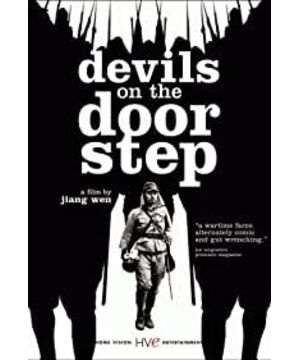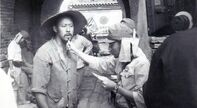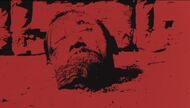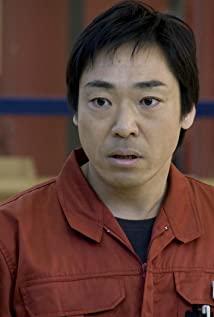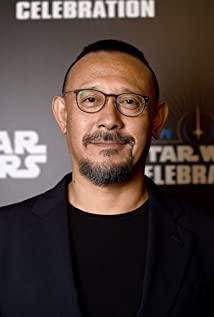This film is simply amazing. The shaping of the supporting roles, the reversal of the plot, and the metaphors of the characters are all very impressive and deeply felt. I feel like I have a lot to say, but I don't know where to start. I would like to tell the whole story of my feelings again.
opening
At the beginning, the Japanese army played a cheerful naval march. After walking into the village, you could see a Chinese nodding and bowing, showing the villagers' servility and respect for the Japanese army, which made me feel uncomfortable. Comparing it with the Japanese generals giving candy to children, it seems that the Japanese are the masters of this territory, while the Chinese are servants and have no desire to resist.
"I" appears for the first time
The very mysterious "I" in the whole film made his first appearance. He never showed up and gave them two bags of sacks (two living people), saying that they would go back in thirty (that is, a few days later) to get them. He also forced him, those people must live, or he will die. However, in fact, after half a year, no one came to pick up people. After watching the whole film, I am more inclined to be the "communist" who gave people to the villagers and let the people bear this responsibility.
During the War of Resistance Against Japanese Aggression, the "Communist" has always implemented measures that all the people will participate in the war together, making the Japanese army unable to guard against it, leading the Japanese army to adopt the "Three Lights" policy. Some people may say that this is to let the common people take the blame. However, this is a battle to defend the motherland. If the country is gone, what will the people do?
After the two of them were interrogated, they learned that one of them was an interpreter and the other was a Japanese soldier. The Japanese army was still very stubborn at this time, and would rather die than give in. He kept scolding the villagers, but the translator came out with good words, which led to laughter. Huawu asked the translator to teach him a few words to scold them in Chinese, but he shouted "Happy Chinese New Year, brother and sister-in-law, you are my father, I am your son"
These two people are the laughing fruit of the first half. They tried three times in total to escape from prison. The first time was to call for help to the navy who sang happily every day, but the drumming was too loud and I couldn't hear it.
The second time was when the chickens were tied with Japanese clothes and weaved, so that the Japanese could see them when they caught the chickens. This is quite exciting
The third time is to teach a child Japanese and let him help call for help
The two trapped people are racking their brains to escape, while those in Guan are racking their brains to get the two immortals away. It's not easy to explain to "me" if you take it away, but if you don't take it away, the two of them always make new tricks. Until the last time I couldn't stand it anymore, I had to go to the city to find someone to help kill
During their discussion, the funniest scene was that some villagers couldn't take it anymore, and they all put their heads over to let Ma Dasan cut them off. As a result, when he picked up the knife, all of them ran away. Makes me feel like I'm trying to get my own good and then forcing others to do it. This description reminds me of the villagers in "Seven Samurai". If they treat me well, I will nod and bow like a servant. If you don't help me, I will secretly make small gestures and say that you are not good. It shows the selfish side of the villagers.
There is also a very funny scene. When the aunt was scolding the Japanese army, she checked to see if there was anyone outside. He also said that he did nothing wrong, so why did he kill me? It's like the Japanese army only kills bad guys, the War of Resistance Against Japanese Aggression has nothing to do with me, and what happened to other people has nothing to do with me.
When Ma Dasan went into the city to find someone to help kill, he and his fourth cousin met a national soldier who was captured by the Japanese army. Watching a play, laughing at others. A person who contributed to the country was ridiculed for being brave. How ironic!
Later found a knife Liu, was said to be the executioner in the Cixi era, the people who were killed smiled Jiuquan. When they came to the place where they were locked, they showed off an operation. I found this clip to be very interesting. Wherever they go, the villagers follow them, and then hide and watch from a distance in fear.
After a long operation, I thought the two of them were already dying. Unexpectedly, they are not dead yet, and the joking plot will go on. Yidao Liu said goodbye because he couldn't make another slash.
This is in stark contrast to what follows, and once again satirizes us.
Later, the Japanese who were tortured did not want to die, so he asked to exchange them for food.
The villagers finally agreed to their request and went to the Japanese territory to trade.
Unexpectedly, it turned out to be a success, and also held a gala with the Japanese army.
"Sad and Joy"
Everyone sang happily and felt like they had reached an idealization, like Japan and China getting along well together, this war is over.
Unfortunately, the good times didn't last long. The harmony of all this was destroyed by the general. When he asked where the person who captured the flower house was, he didn’t say anything at the end of the answer, and was killed by the flower house. Everything got messed up. Liuwang was killed by the flower house, the most prestigious old man in the village was killed by the Japanese recruits, some were stabbed to death, drowned by food, and children were killed.
Crazy Seventh Master came out and shot the Japanese army with muskets, his hands were chopped off and he was burned to death by putting them into the fire. Now they can no longer resist, they are already waiting to die.
How humorous the first half is and how tragic the second half is.
After the Japanese burned down the village, Ma Dasan came back and found that it was gone.
Later, the Kuomintang came and occupied the city. Ma Dasan also sold cigarettes in the city. He seemed to have lost his soul. When the captured Japanese soldiers came to buy cigarettes, they suddenly got angry and killed the prisoners. They went into the prison camp and killed a Japanese when they saw a Japanese. When they met the flower house, they were about to kill him. , was stopped by the Kuomintang people.
The last scene is the execution process of Ma Dasan for killing too many Japanese. A Kuomintang person borrowed the hands of the Japanese, and it happened that Hanaya was the executioner and cut off his head.
After being beheaded, Ma Dasan rolled his eyes several times on the ground before closing his eyes. It was as if Ma Dasan's eyes were watching these absurd scenes. This scene turned into color
The last scene really took me by surprise, the sublimation I can't express in words, it's so wonderful to express it in this way, and it's very creative.
The whole film is the essence of the back, that is, the Chinese kill the Chinese.
With a knife, Liu slashed the Chinese without batting an eye, without any guilt. It is really hateful to compare the Japanese who are afraid of suffering and dare not use the knife, throw the knife, slap the buttocks and leave.
A certain villager said that he was worried that "I" would come to take people. Is "I" stronger than the Japanese? (Are you still afraid of them with the support of the Japanese? A certain villager nodded to the Japanese army; people who said jokes praised the Japanese army later began to praise the Chinese nation, Britain and the United States after the Japanese army collapsed. For the Chinese at that time, there was no one of their own at all. The motherland consciousness, anyone can come, just don't bully me. If you are strong, you will die, you will be a servant. And if you are weak, you will keep showing off and be strong.
This is why in the end the villagers in the village suffered such a tragic incident, it was none of their business. Showing and exaggerating the ignorance, numbness and servility of the Chinese people. And this is the most real Chinese people of that era. The Eighth Route Army base area where the soldiers and the people are as close as one family, and the common people who share the same hatred against Japan, are only one-sided and single. In the enemy-occupied areas where there is no army stationed, the common people live every day like this. What we are talking about now is patriotism. In the past, most of the villagers did not exist, as long as they were alive, it was so realistic. I only hated the Japanese when my village was killed.
The only person who resisted in this village was the mad seventh master. Perhaps in that crazy era, crazy people were more needed to do crazy things. Or maybe he is the only normal one.
When Ma Dasan was beheaded by a Japanese, he was ordered by the Kuomintang. He has already seen through the world, and he would rather die than stay in this bantering world. Thinking of that sentence , "Turn your head nine times and blink three times, the corners of your mouth are upturned. What is Jiuquan with a smile, this is Jiuquan with a smile." However, this smile is nothing but a sneer at the world. Say goodbye to this bastard world.
"die"
The film's description of death immediately reminded me of "Shadow Warrior" and "Schindler's List". The former died for the final glory of his country, and he was unwilling to the decline of his country. Shang walked the bloody road alone, and shouted the country's last unyielding in front of many enemies. In the end, the flag of the country drifted along with the sea, and died together with the country's demise.
That touch of red on the latter little girl. In the cluttered crowd, a little girl was walking in confusion, as if looking for her parents, but also looking for her own way home. This cute, innocent little girl was painted bright red in black and white by the director. This dark red is also a trace of kindness and innocence left over from that crazy and war-torn era, because a child's world will always be the purest and most beautiful. At the same time, the little girl and her red color also represent the only ray of hope left in that dark and cruel age. However, this hope was quickly extinguished by the German army, and the dark red little girl in the next shot was already in a pile of corpses. It was precisely because of this little girl that Schindler hit his heart deeply, and it was also the turning point of the whole film, and he began to save the Jews.
There is one answer in Jiang Wen's interview that I like very much
Why don't I always talk about "patriotism"? Jiang Wen said: Patriotism does not need to be aroused, as long as a person still knows who he is and has a certain respect for his personality, he will love his motherland. Lu Xun's irony and sarcasm on certain issues in his own nation and culture is also full of love. Why doesn't he make fun of Japan? Because he wants China to lose its neck and become stronger than Japan. This is the greatest patriotism. Conversely, some people pretend to praise and sing praises for their own selfish desires, so as not to let people see the essence of the problem, then Just like Dong Hanchen, the translator in our film. I think the "patriotic thieves" are more terrifying than the "traitors". They use the banner of "patriotism", but the harm is even greater than that of "traitors". Although I can't reach it Lu Xun is of such a high level, but I admire and admire him very much. He is sometimes acerbic, but he sees problems accurately. In contrast, many people do not see problems, do not want to see problems or I don't want to say it when I see it. I understand the high level of Lu Xun as the "national soul". If there are hundreds of Lu Xuns, this country will be very great.
View more about Devils on the Doorstep reviews


